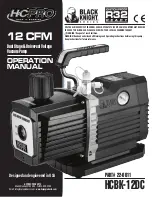
5
SECTION B: GENERAL INFORMATION
B-1) To the Purchaser:
Congratulations! You are the owner of one of the fi nest pumps
on the market today. CP&S pumps are products engineered
and manufactured of high quality components. Over one
hundred years of pump building experience along with a
continuing quality assurance program combine to produce a
pump which will stand up to the toughest applications. This
manual will provide helpful information concerning installation,
maintenance, and proper service guidelines.
B-2) Receiving:
Upon receiving the pump, it should be inspected for damage
or shortages. If damage has occurred, fi le a claim immediately
with the company that delivered the pump. If the manual
is removed from the packaging, do not lose or misplace.
B-3) Storage:
Short Term-
CP&S Pumps are manufactured for effi cient
performance following short inoperative periods in storage.
For best results, pumps can be retained in storage, as factory
assembled, in a dry atmosphere with constant temperatures
for up to six (6) months. Long Term- Any length of time
exceeding six (6) months, but not more than twenty-four (24)
months. The unit should be stored in a temperature controlled
area, a roofed over walled enclosure that provides protection
from the elements (rain, snow, wind-blown dust, etc.), and
whose temperature can be maintained between +40 deg. F
and +120 deg. F. (4.4 - 49°C). Pump should be stored in its
original shipping container. On initial start up, rotate impeller
by hand to assure seal and impeller rotate freely. If it is
required that the pump be installed and tested before the long
term storage begins, such installation will be allowed provided:
1.) The pump is not installed under water for more than
one (1) month.
2.) Immediately upon satisfactory completion of the test,
the pump is removed, thoroughly dried, repacked in the
original shipping container, and placed in a temperature
controlled storage area.
B-4) Service Centers:
For the location of the nearest Barnes Service Center, check
your Barnes representative or Crane Pumps & Systems, Inc.
Service Department in Piqua, Ohio, telephone (937) 778-8947
or Crane Pumps & Systems Canada, in Brampton, Ontario,
(905) 457-6223.
SECTION C: INSTALLATION
C-1) Location:
Water feeding and discharging for construction and civil
works; Water supply and sewage works; Various kinds of
industrial facilities; Housing and building facilities.
The pump can be used at almost all places but avoid
continuous short-water operation at a sandy place, such may
accelerate wear of the pump. Install the pump at a position
where water can be collected most easily. When the pump is
installed on soft muddy or sandy ground, lay wooden board
or block under the body.
DO NOT allow pump to be buried
in mud or sand.
Not to be installed in locations classifi ed as Hazardous in
accordance with the National Electric Code (NEC), ANSI/
NFPA70, or the Canadian Electric Code (CEC).
Submergence:
It is recommended that the pump be operated in the
submerged condition and the sump liquid level should never
be less than dimension “A” in Figure 1.
Before pumping fl uids other than water, consult the factory,
giving fl uid, fl uid temperature, specifi c gravity, viscosity,
capacity in USGPM and total head and/or pressure
requirements, including friction loss through discharge line,
fi ttings, valves, etc. Maximum fl uid temperature for sustained
operation is 104°F (40°C) at specifi c gravity 1.0.
IMPORTANT ! - Pump should have strainer
affi xed at all times. Inspect and clean the pump
strainer periodically for maximum effi ciency and
performance.
C-2) Discharge:
When any hose is used for connection, keep the hose as
straight as possible as excessively bent hose reduces water
quantity. Refrain from placing the discharge port (end of hose
or pipe) under water. Inverse fl ow may sometimes be resulted
due to siphon effect when the operation is stopped.
C-3) Electrical Connections:
C-3.1) Power Cord:
The cord assembly mounted to the pump must not be
modifi ed in any way except for shortening to a specifi c
application. Any splice between the pump and the control
panel must be made in accordance with the electric code
and all applicable state, province and local electric codes.
It is recommended that a junction box, if used, be mounted
outside the sump or be of at least NEMA 4 (EEM4C-4)
construction if located within the wet well.
DO NOT USE THE
POWER CORD TO LIFT PUMP!
FIGURE 1
Summary of Contents for Barnes SED Series
Page 12: ...12 FIGURE 12 ...
Page 14: ...14 FIGURE 13 Series SED ...




































